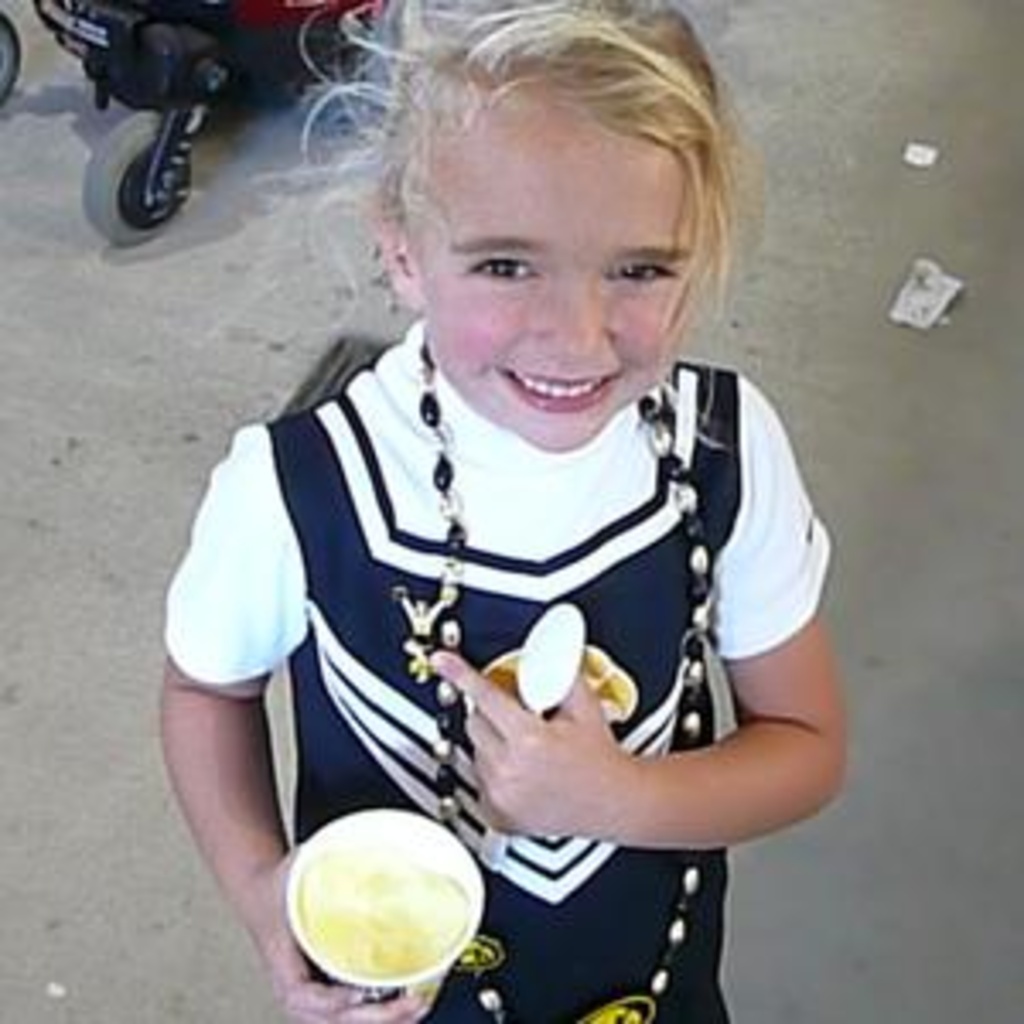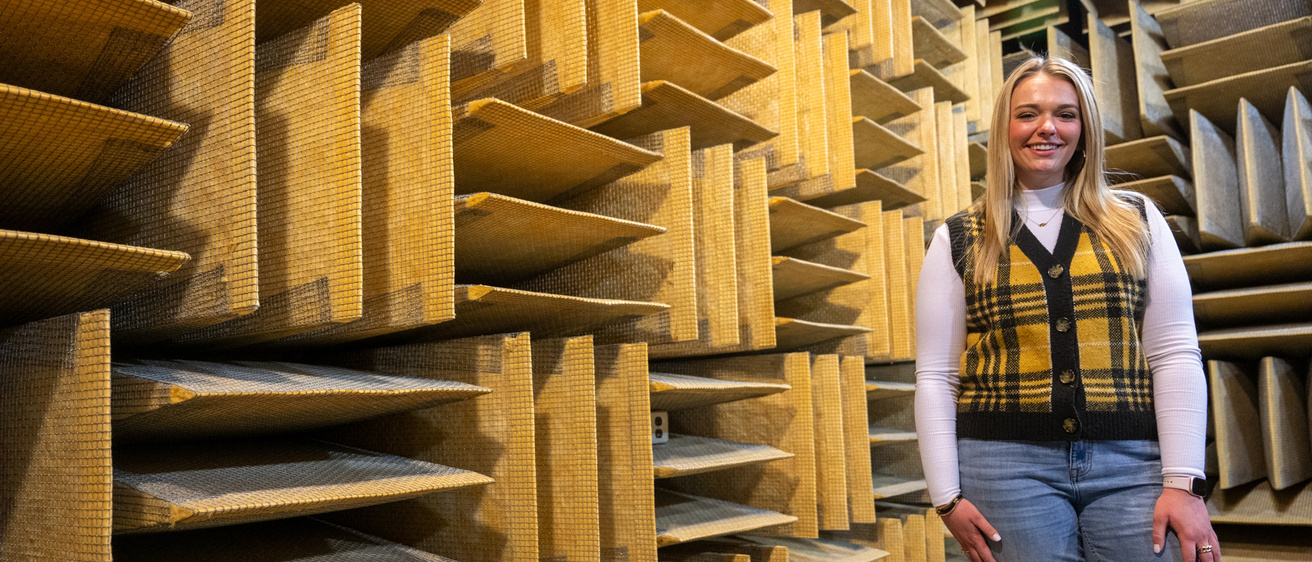Story: Emily Nelson
Photography: Justin Torner
Published: May 1, 2024
Treatment for a childhood stutter led Abbi Shekleton to her future professional passion.
“I had a great experience with my speech-language pathologist. She really cultivated a love of the field within me,” says Shekleton, who grew up in Princeton, Iowa. “I saw a lot of potential in what can happen with a therapist who is kind, compassionate, and knowledgeable. I thought, ‘I want to be that person for someone else.’”
Shekleton says she’s known that she would attend the University of Iowa since she was little.
“I was going to football games with my dad since I was 6; he kind of raised the Iowa culture within me.”
It was a happy coincidence that Iowa also happened to be ranked sixth in the country for speech-language pathology.
“It’s the birthplace of the field, and I thought, ‘What an honor to be a part of an amazing program that actually started at the university,’” Shekleton says.
Shekleton got a BA in speech and hearing science in 2022 and will graduate this spring with an MA in speech pathology. After graduation, she’ll start a yearlong clinical fellowship at UnityPoint Health–St. Luke’s Hospital in Cedar Rapids, Iowa, followed by a full-time position there as a speech-language pathologist.
She hopes to work with older adults and those affected by neurodegenerative diseases.
“My great-grandpa had Alzheimer’s disease, and I knew that I wanted to work with the neurodegenerative disease population,” Shekleton says. “I love older adults, and I find that they’re an often-overlooked population.”
What are your earliest memories of your time on campus?
My very first memory would be Kickoff at Kinnick. I came from a small high school, and that was the first time I got to see how large the student body was at Iowa. When we all formed the “I” formation on the field, you kind of look around and think, “Wow, these are all freshmen at Iowa.” And it kind of makes you realize how small you are, but you look around at all the people who are here for the same reasons you are. It was kind of a wow moment for me.

Abbi Shekleton
Hometown: Princeton, Iowa
Degree: Master’s degree in speech pathology.
What’s next: A yearlong clinical fellowship at UnityPoint Health–St. Luke’s Hospital in Cedar Rapids, Iowa, followed by full-time position there as a speech-language pathologist.
Above photo: Abbi’s father gave her a Hawkeye cheerleader pin when she was little. She continues to wear it to Hawkeye games to this day.
What has been one of your favorite traditions while you’ve been a student?
I love the Pancake Man during finals week. Finals week is so stressful, but if there’s one person who can put a smile on my face during finals week, it’s the Pancake Man. My senior year, I went to the Pancake Man and I got chosen to be the person who catches the pancakes that he was flipping, and I actually got hit in the face with one of the pancakes, which was so embarrassing but also awesome.
What does being a Hawkeye mean to you?
Being a Hawkeye means being a part of a greater whole. It also means you’re family when you’re a Hawkeye. I was really nervous coming to college about feeling alone and being away from home. And truly, the Hawkeye community picked me up. They took me under their wing and showed me what it means to be a Hawkeye.
What has surprised you about your time at Iowa?
I have made so many connections with people throughout a multitude of professions. I found myself working alongside music therapists and psychologists, people whom I may not have interacted with normally. And that’s truly something I never would have expected.
What has provided you with the greatest sense of belonging at the University of Iowa?
My primary sense of belonging came from my relationship with my mentor. She took me under her wing my freshman year. She got me involved with research. I had approached her saying I felt a little lost; I didn’t quite know which direction to go. I was even contemplating leaving the field. But she took me under her wing and said, “Come try my research lab for a semester.” I did, and I never left. I stayed there for the entire three years of my undergraduate degree, and I continued into my graduate degree as well.
I found friends through that lab. I made connections with older graduate students as a freshman who took me under their wings, too, and mentored me. All these different things that I would never have thought of had I not joined that lab, had it not been for Dr. Si On Yoon.
How has participating in research impacted your time at Iowa?
I got involved in research right away as a first-year student, which is such a great thing about this university. I’ve talked with friends who went to different universities where being in research isn’t even allowed until your junior and senior year. Well, I got involved my freshman year. It’s amazing.
I got to present my independent research study looking at lexical differentiation across the lifespan at a conference in Atlanta, Georgia, as a junior in undergrad. My professor also submitted me for a talk at the Human Sentence Processing conference in California, and I actually was selected to give a talk and not just a poster presentation. I was up against doctors and PhD candidates, and I was the only undergrad at that entire conference who presented a talk. I fielded questions from people around the world, which was an incredible experience.
As a graduate student, I was involved in Dr. Hayo Terband’s apraxia lab for children who have apraxia of speech, which is a speech disorder caused by a problem with communication between the brain and the muscles used for speech. I got to build that lab from the ground up. I helped create research protocols. I was in communication with the music therapy department. I even planned an international training in which a group from the Netherlands came over and presented a program on how to use music therapy as a way to target childhood apraxia of speech, which was an incredible experience. It’s probably been my most valuable research experience so far.
What did you get out of your Iowa experience that you don’t think you would’ve gotten if you had gone somewhere else?
The clinical experiences here at my graduate program are something that Iowa offers that is not comparable to other universities. We see patients across the lifespan with a multitude of diagnoses. We have the Wendell Johnson Speech and Hearing Clinic where we see patients. We go over to Stead Family Children’s Hospital and work with pediatric feeding and swallowing patients. I’ve been a part of the cochlear implantation team at University of Iowa Health Care. I’ve been involved at the inpatient neurology floor, working with patients who have had recent brain injuries. And I am in grad school and get to work with these patients, which is an incredible experience.
